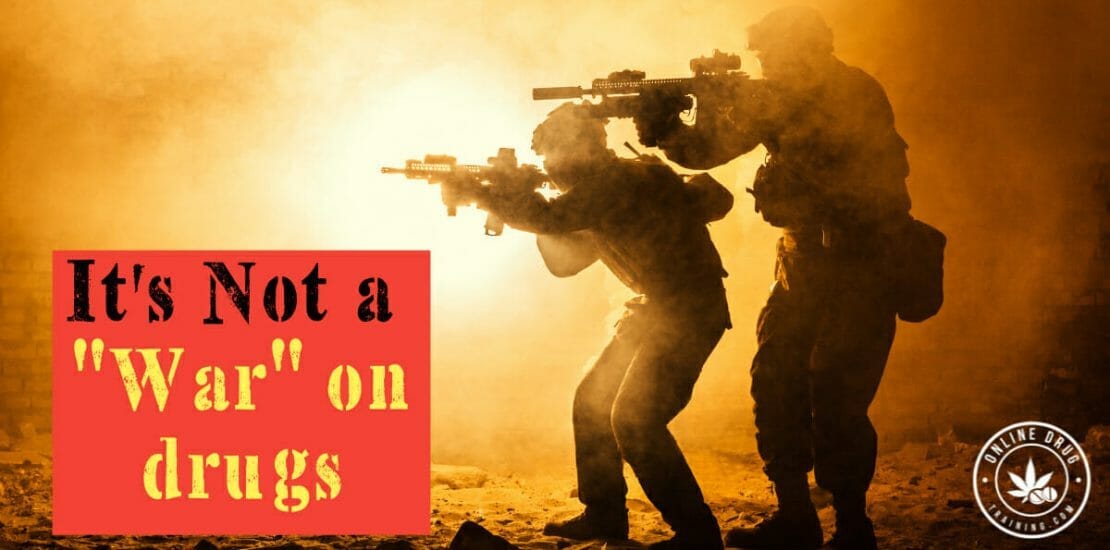A New Name for a New Era: Rethinking the "War on Drugs"
The phrase "the war on drugs" has been widely used to describe the efforts of various governments and organizations to address the issue of drug abuse. However, the use of this phrase is misguided, as it frames the problem in a way that does not accurately reflect the true nature of the issue.

What is the War on Drugs?
The war on drugs refers to the ongoing efforts to reduce drug abuse, drug trafficking, and drug production. This term was first used by President Richard Nixon in 1971, and since then it has been adopted by many other governments and organizations as a way of describing their efforts to tackle the problem of substance abuse.
The War on Drugs Compared to a Real War
The comparison of the "war on drugs" to a real war, such as the military fighting with weapons and the intention of killing an enemy and conquering a people, is misguided. Substance abuse is not a military problem, and it cannot be solved through the use of military force.
In a real war, the enemy is defined, and the goal is clear. The military is equipped with weapons and trained to use them effectively. In the case of substance abuse, the enemy is not easily defined, and the goal is not clear-cut. Substance abuse is a complex issue that involves multiple factors, including biology, psychology, social and cultural factors, and access to substances.
The phrase "war on drugs" implies that the problem of drug abuse can be solved through a military-style campaign. This is a misconception, as drug abuse is a complex issue that cannot be solved through a one-dimensional approach. Substance abuse is a public health issue that requires a comprehensive, multi-faceted approach that addresses the root causes of the problem.
The Need for a New Approach
To effectively address the issue of substance abuse, we need a new approach that recognizes the complexity of the problem and the importance of addressing its root causes. This approach should be based on evidence-based practices and should involve collaboration between different sectors, including healthcare, social services, law enforcement, and the community.
The Importance of Prevention and Treatment
Prevention and treatment are essential components of any effective approach to addressing substance abuse. By focusing on prevention, we can help individuals avoid drug use in the first place, and by providing access to effective treatment, we can help those who are struggling with substance abuse to overcome their addiction.
Addressing Social Determinants of Substance Abuse
Substance abuse is often rooted in social determinants such as poverty, homelessness, and lack of access to healthcare and education. To effectively address substance abuse, we must also address these underlying social determinants. This requires a comprehensive approach that involves collaboration between different sectors, including healthcare, social services, and education.
Conclusion
The phrase "the war on drugs" is a misguided and oversimplified way of framing the issue of substance abuse. To effectively address this issue, we need a new approach that recognizes the complexity of the problem and the importance of addressing its root causes. This approach should involve collaboration between different sectors, including healthcare, social services, law enforcement, and the community. By working together, we can help to reduce the harm associated with substance abuse and improve the lives of individuals and communities.
FAQs
What is the War on Drugs?
The War on Drugs refers to the ongoing efforts to reduce drug abuse, drug trafficking, and drug production. It was first used by President Richard Nixon in 1971.
Is the "war on drugs" a real war?
No, the "war on drugs" is not a real war in the traditional sense. It does not involve the military fighting with weapons and the intention of killing an enemy and conquering a people. Substance abuse is a complex issue that requires a different approach.
What is the difference between the "war on drugs" and a real war?
The difference between the "war on drugs" and a real war is that substance abuse is a complex issue that involves multiple factors and cannot be solved through the use of military force. In a real war, the enemy is defined, and the goal is clear, while in the case of substance abuse, the enemy is not easily defined and the goal is not clear-cut.
Why is the "war on drugs" an inadequate frame for battling substance abuse?
The "war on drugs" is an inadequate frame for battling substance abuse because it does not accurately reflect the reality of the situation and the strategies being employed to address the issue. Substance abuse is a complex issue that requires a comprehensive approach based on a deep understanding of the problem.
What is a better approach to addressing substance abuse?
A better approach to addressing substance abuse is one that is based on a comprehensive understanding of the problem and addresses the root causes of substance abuse. This can include improving access to treatment, increasing public awareness and education, addressing the social determinants of substance abuse, and improving the availability of support for individuals and families affected by substance abuse.



